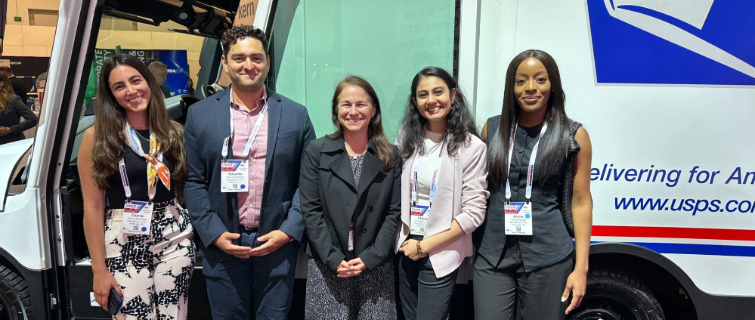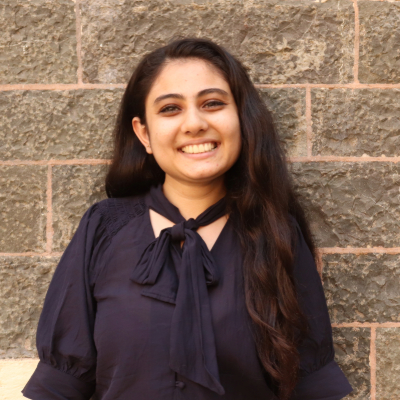
Who said direct mail is dead? Certainly not anyone working in marketing today—and certainly not Chitral Shah and Eduardo Mostrom, students of the Master’s in Integrated Marketing Communications program at Georgetown University. As students, they won the Direct Effect™ Innovation Challenge sponsored by Capital One and the United States Postal Service, which centered on “The Forgotten Marketing Tool.”
Chitral Shah: Following My Gut

When I was growing up, ads didn’t have a skip option, and over-the-top (OTT) advertising was not at its peak. However, the ads I knew and loved as a child remained in my head—I would ponder on them, analyzing their storytelling impact, sometimes even repeating the dialogues or jingles I loved. This was when I started understanding their power: the ability to use emotions to persuade someone’s feelings. Discussions evolved over the years and so did the means of communications. My curiosity to understand the ‘whys’ behind these influences led me to embark on a journey of exploration.
After a brief stint in public relations, I knew one thing for sure: I thrived in a fast-paced, ever-changing environment. It fueled my passion to change the world for the better. However, I also recognized a gap—I needed more skills to wield communications as a tool to craft impactful narratives. That’s when I decided to pursue a Master’s in Integrated Marketing Communications at Georgetown University. This program equipped me to answer the crucial question of ‘why it matters’ for brands.
Every class I took had one common takeaway: To curate the most strategic and creative approach, I needed to be cognizant of the ever-evolving business and cultural dynamics of the world. During my Consumer Research & Insights class, we learned how to unearth the ‘why’ and understand the underlying motivation for the way consumers behaved or reacted to an ad. This understanding played a pivotal role in winning the Direct Effect™ Innovation Challenge.
The aim of the challenge was to design a well-rounded, and research-driven campaign rooted in facts, but also remain engaging and relevant. In other words, an out-of-the-box campaign, and in the process try to achieve every marketer’s dream: to create something extraordinary. Initially, the thought of working with eight equally curious marketing professionals, whom I barely knew, felt daunting. To come up with a campaign in just four hours for Capital One seemed nearly impossible. However, I was in awe of how ideas floated around the table and how passionate we were while competing with other universities and pitching to the client. No one settled for anything less than extraordinary. In my opinion, we won because we worked as a team: brainstorming, playing to our strengths, and then coming together to combine our research insights to paint a colorful story. We truly believed in what we had created; it was as if we had a powerful gut feeling that our idea would work in reality.
Winning came with its perks. We were invited to present at the National Postal Forum (NPF) in Indianapolis to share our experience.
My biggest takeaway from winning and attending the NPF was the importance of staying adaptable in a constantly changing world. And sometimes, change doesn’t always mean looking into the future— but sometimes the past, too. I learned about direct mail, a marketing tool that I thought was almost ancient, only to realize the power it holds today and the reach it has. Listening to professionals from all walks of life talk about their gut feelings, and how direct mail can make a difference, made me pause and reevaluate everything I’ve learned so far.
It made me reflect upon the idea of integrated marketing. I was probably forgetting that there is more than one creative direction to stand out amid the social media clutter.
So what is this gut feeling? To me, it is a feeling of empowerment, one that makes me believe in the power of communication. In marketing, you have the opportunity to drive messaging through various channels depending on your campaign goals and this opportunity proved that there is still a place for direct mail. This gut feeling matters because it drives me to create stories that make this world a better place, ones that are worth remembering, just like the ad jingle I remember from when I was 5.
Eduardo Mostrom: Discovering Forgotten Marketing Tools

Having majored in public relations, with a couple of internships and relevant work in media relations and content development, I landed my first job in financial technology, or “fintech”, for a trade association. I realized that the digital era that we live in now requires more than just traditional media since we cannot use the press for everything, but we can use other tools such as email marketing, owned websites, and digital ads.
I started my journey at Georgetown University SCS with a Master’s in Integrated Marketing Communications. My third class was Campaign Management, and we had the opportunity to do an in-depth overview of marketing tools.
In the fall of 2023, I received an invitation to participate in a challenge sponsored by Capital One and the United States Postal Service (USPS). Given my fintech background and Capital One’s involvement with the association I worked for, I believed I had an opportunity to shine in this challenge. The challenge was to implement a plan using direct mail, which is sometimes known as “The Forgotten Marketing Tool.” Over the years, direct mail marketing has lost its visibility among millennials and Gen Z, with many not even knowing what direct mail marketing is.
Many of us grew up with the JCPenney and Fingerhut catalogs and the power they had in bringing us to their stores or calling to order an item. It makes us respond to their call to action and gives the marketer a higher number of impressions than digital. Emulating an agency environment with other Georgetown students, we divided the work into creativity, strategy, campaign planning, and implementation.
After four hours to complete the challenge and a review from judges from Capital One and USPS, Georgetown was announced as the winner. The reason that set us apart was that we were the only team that provided an insight into what the Persona was for the target market Capital One was trying to reach for their Savor Card.
Why did the persona set us apart? Well, it provided an overview of the ideal cardholder they were targeting: a “College Student” who just got their first card, is building their credit, and finds the perks the card offers useful for their lifestyle.
In Spring 2024, we received an invitation to the National Postal Forum in Indianapolis to talk about our experience in the winning challenge. With all expenses paid and the opportunity to network with government officials, top consulting companies, agencies, and tons of cool people, my immediate reaction was “Yes! Let’s go to Indy.”
As marketers, we are constantly bombarded with ideas for digital campaigns with catchy buzzwords that generate high impressions. In my research, I learned about a marketing tool that consistently achieves impressions: direct mail. When you receive a piece of mail, you see and interact with it, even if you do not follow through with the call to action. This level of engagement surpasses that of most digital tools and USPS aims to remind younger generations of the potency of mail marketing. In today’s digital-centric landscape, direct mail can differentiate a marketer.
A few months after winning the challenge, I interviewed with a top agency and had to submit a campaign idea as part of the interview process. While many campaign ideas are often similar, I aimed to distinguish myself by pitching direct mail marketing as one of my tactics. Let’s hope I get the job!
Georgetown University has equipped me with the knowledge to stay current with the latest marketing tools, emerging trends, and effective yet overlooked methods. The opportunities for professional growth and networking at SCS are unparalleled.
